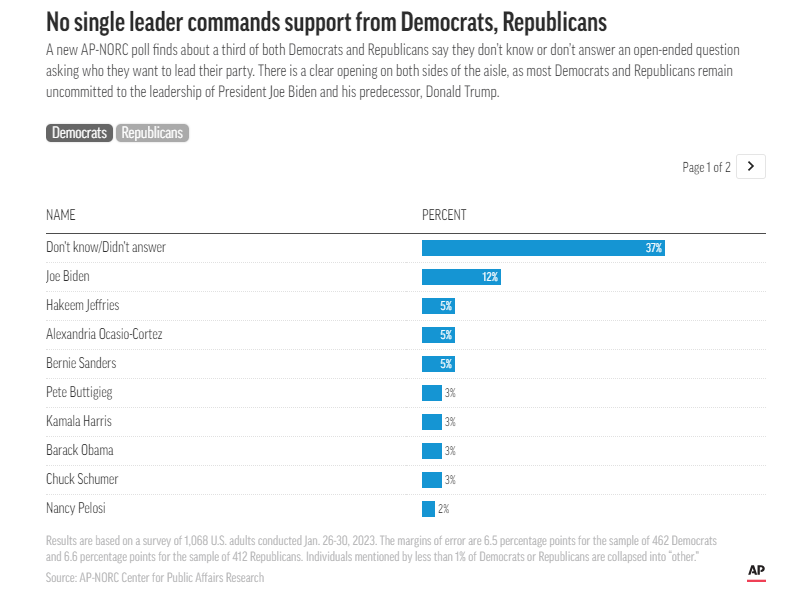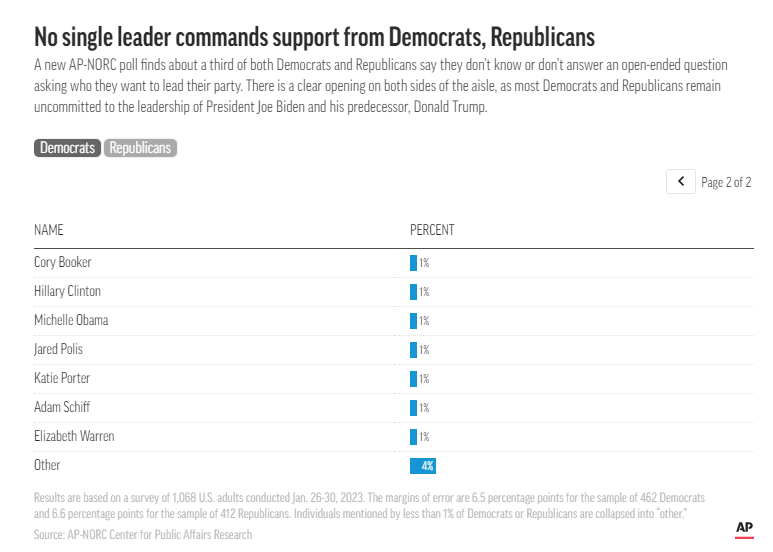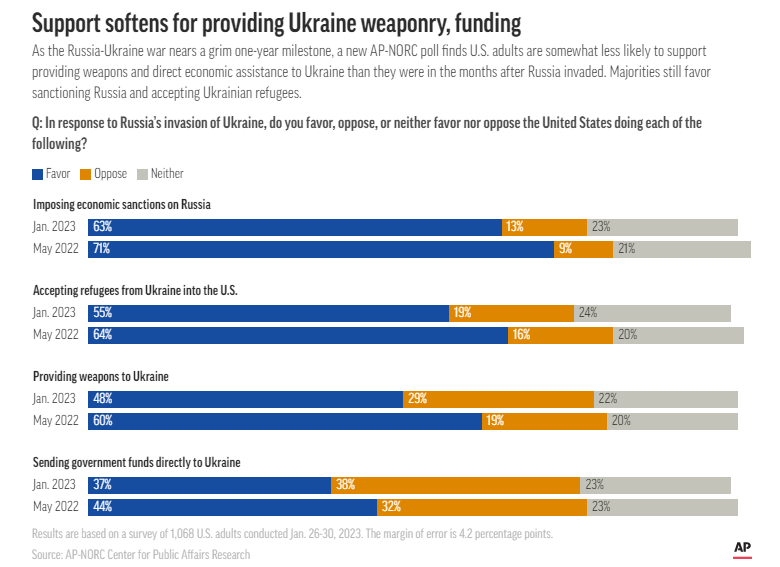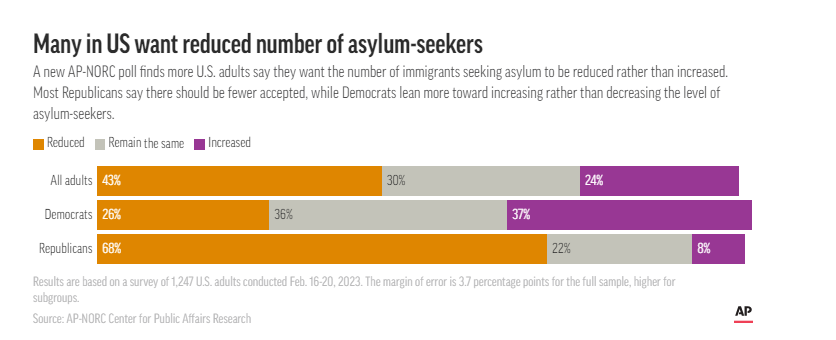By Colleen Long and Emily Swanson | The Associated Press
February 2, 2023
WASHINGTON (AP) — More U.S. adults disapprove than approve of the way President Joe Biden has handled the discovery of classified documents at his home and former office, a new poll shows, but that seems to have had little impact on his overall approval rating.
The new poll from The Associated Press-NORC Center for Public Affairs Research finds 41% of Americans say they approve of how Biden is handling his job as president, about the same as the 43% who said that in December. In the new poll, 77% of Democrats approve of how Biden is handling his job, while 91% of Republicans disapprove, both little changed since late last year.
Biden, who will address a joint session of Congress in his State of the Union address next week, needs all the support he can muster as he strategizes his expected reelection campaign, and has been working to focus voters on his agenda and big legislative wins instead of the documents flap.
Biden’s attorneys discovered classified items in a locked closet in November, as they cleared out his office at the Penn Biden Center, a think tank where he briefly worked after he left government. The records were turned over to Justice Department officials. The discovery touched off a special counsel investigation and additional documents have turned up at his home in Wilmington, Delaware, in searches by his lawyers and by the FBI. Agents also searched Biden’s vacation home in Rehoboth Beach, Delaware, and his former office at the Penn Biden Center.
More people disapprove than approve of his handling of situation since the classified documents were found, 39% to 23%, Another 36% say they neither approve nor disapprove. Democrats are more likely to approve than disapprove, 44% to 15%, with 40% saying they have no opinion either way.
A majority of Republicans, 68%, say they disapprove, with 6% saying they approve and 24% expressing no opinion either way. Republicans are also somewhat more likely than Democrats to say they’ve heard at least some about the situation, 71% to 63%.
“To me, it seems like he’s doing the right things, and this happens, people have these documents, Trump and now Mike Pence, too,” said Candace Porth, 72, of Phoenix, a Biden supporter. “It happens. I think people who are supportive of Biden, they understand.”
In follow-up interviews, some poll respondents said they distinguish between Biden voluntarily turning over documents and the behavior of former President Donald Trump, who refused to hand over hundreds of documents, prompting the FBI to raid his home. Still, many are troubled that leaders can’t seem to properly handle sensitive information.
“I feel like it is a big problem in general,” said Jenifer Hudgins, 36, of Gadsden, Alabama, a Democrat who voted for Biden. “I do not feel like any official should have classified documents in their possession, especially at personal residences. It does make you wonder why they have these documents at their residences.”
Trump is facing a special counsel investigation into his retention of several hundred classified documents and other government records at his Mar-a-Lago estate in Florida — and his resistance to giving them up, which led to an FBI warrant and nighttime search to seize them last August.
Banty Patel, a 46-year-old Republican from New Brunswick, New Jersey, said it seems like the same problem to him, but Trump and Biden are being treated very differently.
“I think it looks worse for Joe Biden. He went on the news and said he’d always comply with the FBI and then later they discovered he had documents, too.”
Most Americans have paid at least some attention to the ongoing investigation into classified documents, but they’re not necessarily following it closely. The poll shows that 28% say they’ve read or heard a lot about the situation, while another 35% say they’ve heard some about it but not a lot. An additional 37% say they’ve heard little or nothing about it.
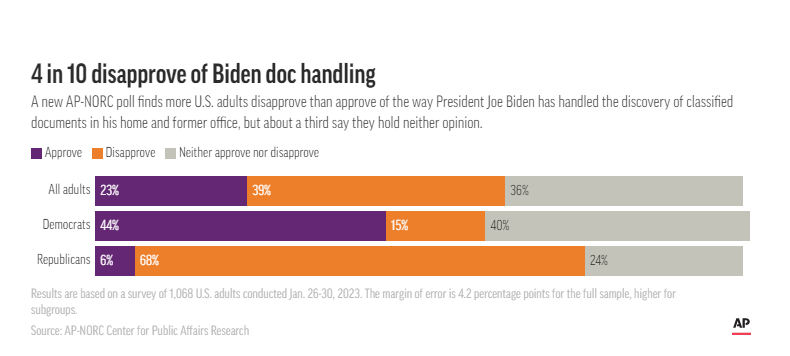
On Wednesday, the FBI searched Biden’s home in Rehoboth Beach, Delaware, but did not find any classified documents there, according to his personal attorney. The Bidens purchased that home, which overlooks a state park adjacent to the beach, in June 2017, months after he left the vice presidency.
Agents did take some handwritten notes and other materials relating to Biden’s time as vice president for review, just as they did last month when they searched his Wilmington home, where they also found classified items.
Biden has said he was surprised by the initial discovery of the documents. His lawyers have described his mishandling of the documents as a “mistake.”
The administration’s public response has been marked by delayed and incomplete information. There are many unanswered questions — on what information the documents contained, exactly how many were discovered and why Biden had them in his possession. Nonetheless, Biden’s attorneys and officials in the White House counsel’s office insist they are being as transparent as possible with the public.
“I am more favorable to Biden than Trump, but I think none of this should be in private hands, it is not correct. They should be kept in government buildings,” said Memduh Can, 45, of Falls Church, Virginia, who said he was an independent who voted for Biden. “For me, though, the most important thing is the economy. If it is managed well, the country will be more secure.”
___
The poll of 1,068 adults was conducted Jan. 26-30 using a sample drawn from NORC’s probability-based AmeriSpeak Panel, which is designed to be representative of the U.S. population. The margin of sampling error for all respondents is plus or minus 4.2 percentage points.

